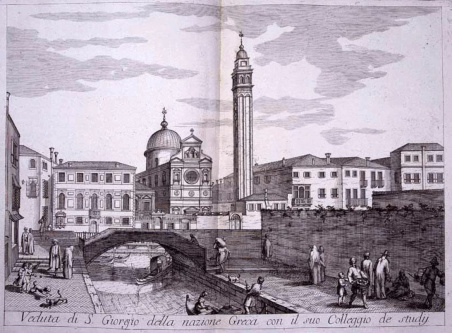The Greeks of Venice, 1498-1600 by Ersie Burke. Book launch
Ersie C. Burke, The Greeks of Venice, 1498‒1600: Immigration, Settlement, and Integration. Turnhout: Brepols Publishers, 2016
People have always emigrated in search of better working and living conditions, to escape persecution, reconnect with family, or simply for the experience. This volume traces the history of Venice’s Greek population during the formative years between 1498 and 1600 when thousands left their homelands for Venice. It describes how Greeks established new communal and social networks, and follows their transition from outsiders to insiders (though not quite Venetians) through an approach that offers a comparative perspective between the ‘native’ and the immigrant. It places Greeks within the context of multi-cultural, multi-ethnic, and multi-lingual Venice.
Personal stories are interwoven throughout for a more intimate account of how people lived, worked, prayed, and formed new social networks. These accounts have been drawn from a variety of sources collected from the Venetian state archives, the archives of the Venetian church, and documentation held by the Hellenic Institute of Venice. Notarial documents, petitions, government and church records, registries of marriages and deaths, and census data form part of the collected material discussed here. Above all, this study aims to reconstruct the lives of the largest Christian ethnic minority in early modern Venice, and to trace the journey of all immigrants, from foreigner to local.
Dr. Ersie Burke was born in Thessaloniki, Greece and at age five immigrated with her parents to Seattle, Washington to join her father’s parents and extended family. In 1975 she moved to Melbourne. She studied History at Seattle University and after graduation became a high school teacher. Later she tutored and lectured in the History Department at Monash University. She taught history at all secondary levels including HSC/VCE Renaissance history, the subject that awakened in her an interest in Venice and its immigrant communities. It was during her first research visit to Venice that she discovered the extensive wealth of archival material on Venetian Greeks. Her PhD advisor, the late Prof. Bill Kent, strongly encouraged and supported her research.
She has published widely on the immigration experience, including Greek economic and social life, the religious status of Venetian Greeks, the contribution of Greek women to the Venetian economy, and the relationship between the state and its Greek subjects.
The book will be available for purchase on the evening (cash only).
Image: “Veduta di S. Giorgio della nazione Greca con il suo Colleggio de studij”, from Il gran teatro di Venezia ovvero descrizzione esatta di cento delle più insigni prospettive, e di altretante celebri pitture della medesima città, Venice, Domenico Lovisa, 1717.
